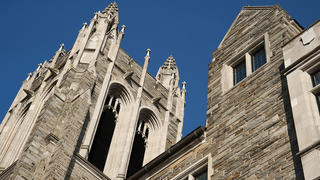Chemistry Lab Receives Over $1 Million Grant for Cancer Protein Research

Editor's note: This article was written prior to University of the Sciences' merger with and into Saint Joseph's University and does not reflect the current, combined institution. References to programs, offices, colleges, employees, etc., may be historical information.
The lab of Zhihong Wang, PhD, associate professor of chemistry and biochemistry, has received a $1.1 million grant from the National Institutes of Health (NIH) to further research to better understand proteins related to cancer.
“Our lab is a protein biochemistry lab and we are really interested in how proteins behave. We are interested in one specific protein family called the RAF Kinase family,” Dr. Wang explained. “This family is highly mutated in cancers.”
A deeper knowledge of the RAF Kinase protein family, specifically BRAF, is one piece of understanding cancer and, eventually, facilitating drug development against it.
“Cancer just seems like such a large, insurmountable problem, but really every research project just breaks down into digestible chunks. At the core of it I believe that I can provide a slice of data to help the eventual development of future therapeutics.” said Alison Yu, a PhD student working in Dr. Wang’s lab.
The grant is an R01 grant, which is awarded to support biomedical research that aligns with the mission of the NIH: “to seek fundamental knowledge about the nature and behavior of living systems and the application of that knowledge to enhance health, lengthen life, and reduce illness and disability”. Dr. Wang’s lab will use the grant to support the research team’s continued study of the activation and regulation mechanism of RAF Kinase proteins, both in normal conditions and in cancerous cells, for the next four years.
“Anytime we have more resources we get to do larger scale projects,” said Yu. “This grant is a really collaborative process. I don't think we would have accomplished it without the grad students before me and the postdocs before me. It's not a single person’s project, it's for all of us.”
Dr. Wang’s lab provides opportunities for hands-on research and collaboration for undergraduate, graduate students, and postdoctoral fellows.
“We not only learn biochemistry techniques, but we also foster critical thinking and problem solving skills. Most importantly, it can ignite a student’s passion for biomedical research.” said Dr. Wang.
Borna Markusic '22 (BC), an international student from Croatia, says that the research experience he’s gained at USciences has been the highlight of his time here.
“I think that you can’t get an opportunity like this at many schools,” Markusic shared. “Dr. Wang is doing amazing work. The R01 grant is unbelievable for such a small lab. The best thing about my study abroad has been this lab.”
